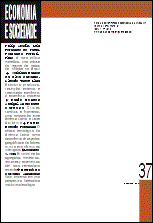Resumo
Este artigo procura demonstrar que a lei do valor possui caráter axiomático e representa fundamento necessário do sistema de preços de produção. Abandoná-la significa romper com o princípio da autofundamentação da ciência, formulado em O Capital, abrir mão do princípio unificador da economia clássica em favor de teorias baseadas em hipóteses graciosas e renunciar a uma teoria geral das economias de mercado. A proposta neorricardiana de se derivar a taxa de lucro e os preços diretamente dos “coeficientes técnicos de produção” e do salário real omite a duração da jornada e a intensidade do trabalho, escamoteando o conteúdo social dessas variáveis.
Abstract
The law of value as the foundation of the prices The law of value as the foundation of the prices This article shows that the law of value is axiomatic and constitutes the necessary foundation of the prices of production. Giving up this foundation means to break with the self-found principle of science, to abandon the unifying principle of classical economics in favor of unsystematic theories based on ad hoc hypotheses and to give up on a general theory of market economies. The neoRicardian proposal to determine prices and the profit rate directly from “technical coefficients” and the real wage omits the length of the working-day and the intensity of the labor process, concealing the sociologic contents of those variables.
Key words: Marxian economics. Standard of value. Value and distribution. Theory of value
Referências
BELLUZZO, L. G. de M. Valor e capitalismo. São Paulo: Brasiliense, 1980.
DOBB, M. A note on the transformation problem. In: ON ECONOMIC theory and socialism. Collected Papers. London: Routledge & Kegan Paul, 1995.
ENGELS, F. (1894). Prefácio. In: MARX, K. O Capital. 1st ed. . Rio de Janeiro: Civilização Brasileira, [s.d.]. Livro III, v. IV, p. 3-24.
FINE, B.; LAPAVITSAS, C.; SAAD-FILHO, A. Transforming the transformation problem: Why the ‘new solution’ is a wrong turning. Review of Radical Political Economics, v. 36, n. 1, p. 3-19, 2004.
GANSSMANN, H.. Transformation of physical conditions of production: Steedman’s economic metaphysics. Economy & Society, v. 10, n. 4, p. 403-422, 1981.
GLICK, M.; EHRBAR, H. The transformation problem: an obituary. Australian Economic Papers, n. 26, p. 294-317, Dec. 1987.
GONTIJO, C. A transformação de valores em preços segundo o Sistema Temporal Único: uma apreciação crítica. Revista EconomiA, v. 9, n. 1, p. 215-243, 2008.
GONTIJO, C. A ‘nova solução’ do problema da transformação de valores em preços: uma apreciação crítica. Revista EconomiA, v. 7, n. 2, p. 225-248, 2006.
GONTIJO, C. On the criticism to the classical method. Revista Brasileira de Economia, v. 54, n. 1, p. 85-122, 2000.
GONTIJO, C. A epistemologia da transformação – Uma crítica ao neo-ricardianismo. Revista de Economia Política, v. 9, n. 3, p. 84-102, 1989.
GRAHAM, A. Non-negative matrices and applicable topics in linear algebra. New York: John Wiley, 1987.
HEGEL, G. W. F. (1812). Ciencia de la lógica. 1st ed. Buenos Aires: Solar-Hachette, 1968.
MARX., K. (1859). Para a crítica da economia política. 1st ed. São Paulo: Victor Civita, 1982.
MARX., K. Elementos fundamentales para la crítica de la economia política (Borrador) 1857-1858. Buenos Aires: Siglo Veintiuno, 1971. 3v.
MARX., K. Economic manuscripts of 1861-1863. In: MARX. K.; ENGELS, F. Collected Works. New York: International Publishers, 1988. v. 30.
MARX., K. O Capital. Rio de Janeiro: Civilização Brasileira, [s.d.]. (1867-1894, 6 v.) ________. El Capital, Livro I, Capítulo VI (Inédito). Buenos Aires: Siglo Veintiuno, 1971.
MONGIOVI, G. Vulgar economy in Marxian garb: a critique of temporal single system Marxism. Review of Radical Political Economics, 32, p. 393-416, 2002.
MONZA, A. Sraffa e sus usos. Cidade de México, 1979. Mimeografado.
MORISHIMA, M.; CATEPHORES, G. (1978). O problema de transformação: um processo de Markov. In: VALOR, exploração e crescimento. 1st ed. Rio de Janeiro: Zahar, 1980. p. 163-195.
NAPOLEONI, C. O valor na ciência econômica. Lisboa: Presença, 1977.
RAVAGNANI, F. A critical note on Moseley’s ‘macro-monetary’ interpretation of Marx’s Theory. Review of Radical Political Economics, v. 37, n. 1, p. 85-96, 2005.
ROSDOLSKY, R. (1968). Génesis y estructura de El Capital de Marx. 1st ed. Cidade do México: Siglo Veintiuno, 1978.
RUBIN, I. (1928). Ensayos sobre la teoria marxista del valor. 1. ed. Buenos Aires: Ed. Siglo Veintiuno, 1974. (Cuadernos P&P).
SAMUELSON, P. Wages and interest: a modern dissection of Marxian economic models. American Economic Review, v. 47, p. 884-912, 1957.
SAMUELSON, P. Understanding the Marxian notion of exploitation: a summary of the so-called transformation problem between Marxian values and competitive prices. Journal of Economic Literature, v. 9, n. 2, p. 399-431, 1971.
SAMUELSON, P. Insight and detour in the theory of exploitation: A reply to Baumol. Journal of Economic Literature, v. 12, n. 1, p. 62-70, 1974.
SINHA, A. The transformation problem: a critique of the ‘New Solution’. Review of Radical Political Economics, v. 29, n. 3, p. 51-58, 1997.
SRAFFA, P. (1960). Produção de mercadorias por meio de mercadorias. In: KEYNES, J. M. et al. Ensaios econômicos. 1. ed.. São Paulo: Victor Civita, 1976. p. 209-290.
STEEDMAN, I. Marx after Sraffa. Thetford: New Left Books, 1978.
TAVARES, M. da C. Ciclo e crise. Tese (Concurso para Professor Titular)–Universidade Federal do Rio de Janeiro, 1978. Rio de Janeiro. Mimeografado.
ZELENÝ, J. (1968). The logic of Marx. 1st ed. Totowa: Rowman and Littlefield, 1980.
A Economia e Sociedade utiliza a licença do Creative Commons (CC), preservando assim, a integridade dos artigos em ambiente de acesso aberto.

